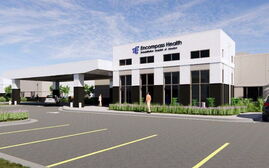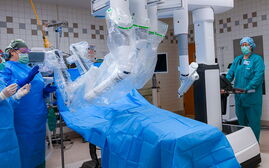Pilot program tests electronic medical-image network
 Photo/Courtesy HealthInfoNet
Todd Rogow, director of information technology for HealthInfoNet, says its new medical image archive will save health care providers time and money
Photo/Courtesy HealthInfoNet
Todd Rogow, director of information technology for HealthInfoNet, says its new medical image archive will save health care providers time and money
A first-in-the-nation statewide medical image archive is expected to save Maine health care providers $6 million over seven years, says Portland-based HealthInfoNet. The pilot program will also make it easier for doctors and other providers to access a patient's complete medical background. Many medical providers don't have a unified imaging network, and instead copy images onto CDs that are then shipped between facilities.
The cloud-based repository, built with support from Dell, will allow health care providers to more quickly and efficiently share patient information with the aim of reducing unnecessary testing and expediting treatment decisions, according to HealthInfoNet.
The pilot program will be launched this summer with three major Maine health care organizations participating. Pending the success of the pilot program this summer, the service could be rolled out statewide by 2013, according to HealthInfoNet.
The three pilot participants, selected for their size and volume of images, are Eastern Maine Medical Center in Bangor, MaineGeneral Medical Center in Augusta and Waterville and Cary Medical Center in Caribou.
The health organizations will test how the image archive works and how it interfaces with their current image storage systems, says Todd Rogow, director of information technology for HealthInfoNet. "You can always expect unanticipated glitches with any technical implementation."
The archive will give doctors immediate access to all of a patient's medical scans, improving diagnosis and treatment recommendations. "This will be particularly useful for radiologists, who often need to see a patient's earlier images to interpret a current imaging study," says Daniel Burgess chief information officer at MaineGeneral Health. "Having these prior studies lets the radiologist see whether diseases like cancer or osteoporosis have worsened, halted or improved."
Organizations within the pilot program will participate for free, aside from costs associated with labor and software updates, according to HealthInfoNet consultant Jerry Edson. That amount is "less than each organization currently pays to maintain its archive," he says. After the pilot is over and the full-scale program launches, participating providers will be charged to put images in the archive.
While many larger health care providers currently share images through Picture Archiving and Communications Systems, those networks are generally tied to only one imaging center, and doctors might need to access multiple PACS to acquire a complete medical image history.
"This project is unique in that it will bring all those images into one archive, giving the provider one place to go to," says Rogow.
An estimated 1.8 million medical images (X-rays, mammograms, CT scans, MRIs, etc.) are generated in Maine each year, totaling more than 45 terabytes of data. The organizations participating in the pilot generate 1.4 million of those images, according to HealthInfoNet.
A survey of Maine's four largest health systems conducted by HealthInfoNet and Dell showed the cost of storing a medical study ranged from 50 cents to more than $4 a study, while transport costs ranged from $4 to $15. Based on an average of $12 per scan, the medical image archive system stands to save Maine providers more than $6 million over a seven-year period in storage and transportation costs.
Elizabeth Mitchell, CEO of Portland-based Maine Health Management Coalition, says that the system has the potential to improve care and reduce cost if implemented correctly. "Anytime a patient's care can be better coordinated, you're more likely to have a better outcome and avoid unnecessary tests and procedures. That will benefit patients and reduce cost," she says.
While the image archive could help to address the ever-rising cost of health care, Mitchell is careful to put the program in a larger economic perspective.
"Overall it's a good development; however a $6 million savings, while important, is a really small percentage of the savings that are needed to bring down cost of health care," says Mitchell. "It's a step in the right direction, but needs to be part of a much larger effort."
As Maine's statewide health information exchange, HealthInfoNet has connected 25 of Maine's 39 hospitals and linked up 182 physician practices, and now serves over one million individuals in the state.













Comments